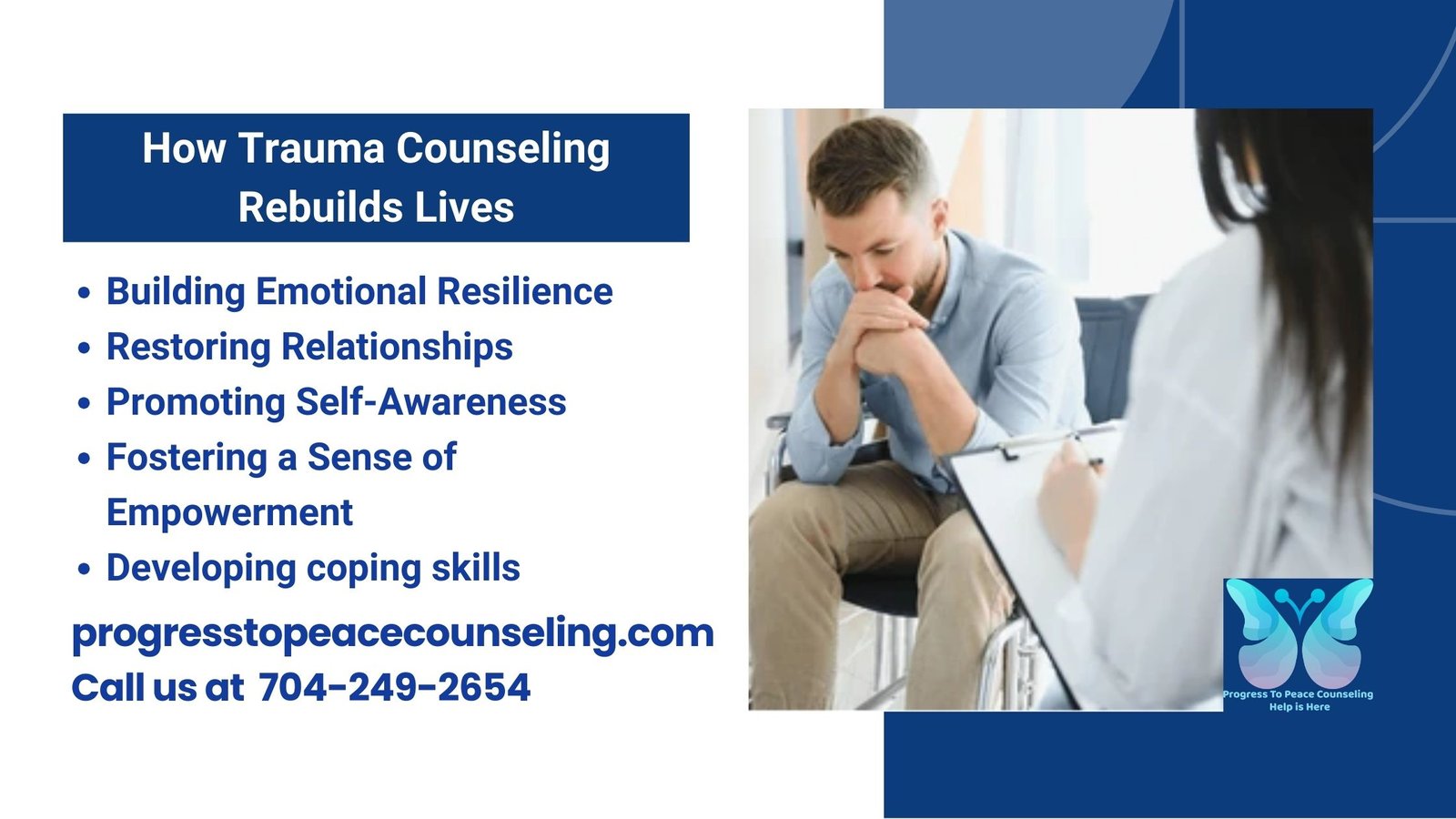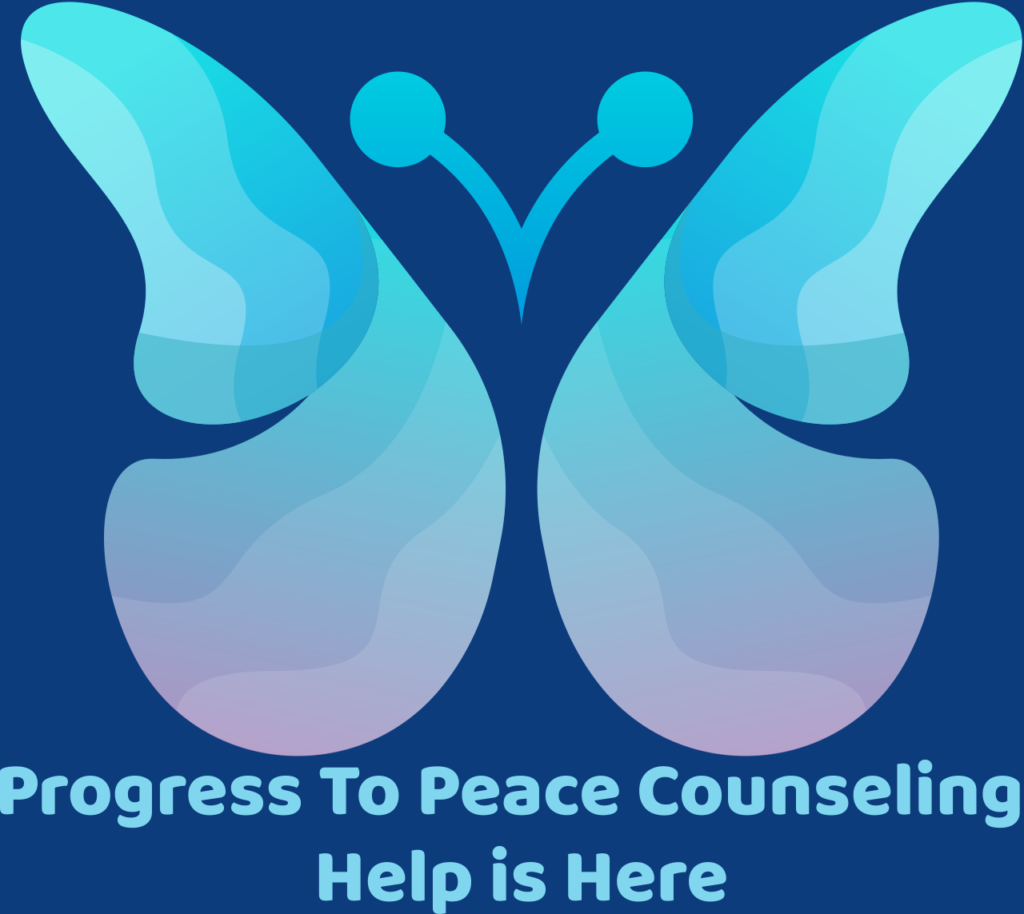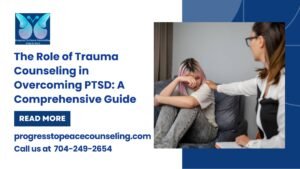Trauma can leave a profound impact on individuals, often disrupting their emotional, physical, and social well-being. Whether stemming from abuse, loss, violence, or accidents, trauma can trap individuals in a cycle of pain and confusion. Trauma counseling, however, provides a lifeline, offering tools and support to rebuild lives and restore hope. If you’re looking for a professional trauma counseling therapist in Charlotte NC, Progress To Peace Counseling is here to guide you. This comprehensive guide will help you understand how counseling can pave the way to recovery.
Understanding Trauma and Its Impact
Trauma is more than just a painful experience; it rewires how the brain processes emotions and memories. The effects can manifest as:
- Emotional Symptoms: Anxiety, depression, anger, and feelings of guilt.
- Physical Symptoms: Chronic pain, fatigue, and sleep disturbances.
- Behavioral Changes: Isolation, substance abuse, or self-harm.
Without intervention, these challenges can create a cycle that perpetuates distress. Seeking the help of a professional trauma therapist can be a transformative step in breaking this cycle.
What Is Trauma Counseling?
Trauma counseling is a specialized form of therapy that focuses on helping individuals process and recover from traumatic experiences. Through a safe and supportive environment, counselors use various techniques to address emotional wounds, reduce symptoms, and promote healing.
Key Approaches in Trauma Counseling
- Cognitive Behavioral Therapy (CBT):
CBT helps individuals identify and change negative thought patterns. It enables clients to reframe their experiences and reduce the emotional weight of traumatic memories. - Eye Movement Desensitization and Reprocessing (EMDR):
EMDR uses guided eye movements to help individuals process trauma and reduce its emotional impact. It’s particularly effective for post-traumatic stress disorder (PTSD). - Somatic Experiencing:
This approach focuses on the connection between the mind and body, helping individuals release trauma stored in the nervous system. - Group Therapy:
Sharing experiences in a group setting fosters connection and validation, reminding individuals they are not alone in their struggles.
If you are exploring these approaches, consulting with an experienced trauma therapist can provide tailored support.
How Trauma Counseling Rebuilds Lives
Trauma counseling isn’t just about addressing symptoms; it’s about empowering individuals to lead fulfilling lives. Here’s how it makes a difference:
1. Building Emotional Resilience
Counseling helps individuals develop coping mechanisms to manage stress and anxiety. This resilience enables them to face challenges without being overwhelmed by past trauma.
2. Restoring Relationships
Trauma can strain relationships with loved ones. Through counseling, individuals learn effective communication and trust-building techniques, paving the way for healthier connections.

3. Promoting Self-Awareness
Trauma counseling encourages self-reflection, helping individuals understand their triggers and emotions. This awareness is key to breaking unhealthy patterns.
4. Fostering a Sense of Empowerment
Counseling shifts individuals from a victim mindset to one of empowerment. They learn to reclaim their narrative, turning their trauma into a source of strength.
The Role of a Trauma Therapist
A trauma therapist acts as a guide, walking alongside individuals on their healing journey. Their role involves:
- Creating a Safe Space: Offering a non-judgmental environment for clients to express themselves.
- Providing Personalized Strategies: Tailoring techniques to each individual’s unique experiences and needs.
- Encouraging Progress: Celebrating small victories and motivating clients to keep moving forward.
Breaking the Stigma Around Trauma Counseling
Despite its benefits, seeking trauma counseling is often met with stigma. Many fear being labeled as “weak” or “broken.” However, counseling is a courageous step toward healing and self-improvement. Breaking this stigma involves:
- Education: Spreading awareness about the importance of mental health care.
- Normalizing Therapy: Sharing personal stories of growth through counseling.
- Encouraging Openness: Supporting loved ones in their decision to seek help.
If you’re considering trauma therapy, know that taking the first step is a powerful act of self-care.
How Progress To Peace Counseling Supports Your Trauma Recovery Journey?
At Progress To Peace Counseling, we are committed to guiding individuals on their journey toward healing and recovery. Trauma can feel overwhelming, but with the right support, rebuilding your life is entirely possible. Our experienced trauma therapists provide a safe and welcoming space where you can openly explore your feelings, process past experiences, and uncover the root causes of your emotional distress.
Using evidence-based therapeutic approaches such as Cognitive Behavioral Therapy (CBT), Eye Movement Desensitization and Reprocessing (EMDR), and mindfulness practices, we create customized treatment plans tailored to your unique challenges and goals. Whether you’re dealing with anxiety, depression, PTSD, or other trauma-related issues, our goal is to help you regain emotional balance and build resilience.
We don’t just treat symptoms—we work with you to empower lasting growth and reclaim control over your life. Healing begins here.
Conclusion
Trauma doesn’t have to define who you are or limit your potential. With the right guidance and therapeutic support, individuals can break free from the emotional weight of their past and step into a future full of possibility. At Progress To Peace Counseling, we understand the deep impact trauma can have, and we’re here to help you navigate your healing journey. Our skilled trauma therapists provide compassionate care, using proven therapeutic techniques to help you regain control, process past pain, and develop healthier coping strategies. The first step toward healing can be transformative. If you or someone you know is struggling with trauma, don’t hesitate to reach out to Progress To Peace Counseling—we’re here to help you start your path to recovery today.
Take the first step—contact us today!














